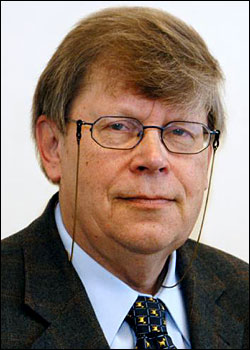Nuclear Safeguards Expert Olli Heinonen to Give a Talk at Brookhaven Lab on 'North Korea, Iran, and Syria – Lessons Learned from IAEA Inspections,' 6/24
Panel discussion on current nuclear nonproliferation issues to follow talk
June 6, 2011
UPTON, NY — Olli Heinonen, a senior fellow at the Belfer Center for Science and International Affairs at Harvard University and former deputy director general for safeguards of the International Atomic Energy Agency (IAEA), will give a BSA Distinguished Lecture titled “North Korea, Iran, and Syria — Lessons Learned from IAEA Inspections” at the U.S. Department of Energy’s (DOE) Brookhaven National Laboratory on Friday, June 24, at 3 p.m. in Berkner Hall. A panel discussion on current issues in international safeguards and nuclear nonproliferation will follow the talk, from 4 to 5:15 p.m.
Both Heinonen’s lecture and the panel discussion are scheduled in conjunction with the Brookhaven course “Nuclear Nonproliferation, Safeguards, and Security in the 21st Century.” The course is supported by the Next Generation Safeguards Initiative, a program of DOE’s National Nuclear Security Administration.
BSA Distinguished Lectures are sponsored by Brookhaven Science Associates, the company that manages Brookhaven Lab, to bring topics of general interest before the Laboratory community and the public. The lecture is free and open to the public. Visitors to the Laboratory age 16 and over must bring a photo ID.
In his talk, Heinonen will discuss the current status of nuclear programs in North Korea, Iran, and Syria. Nuclear verification challenges will be highlighted, and Heinonen will present the lessons learned from IAEA nuclear inspections in these locations, about which concern over nuclear proliferation has been on the upswing. Heinonen will discuss what he believes will be the future of nuclear programs in the three countries, and he will answer key questions: “Does the IAEA have adequate inspection authorities to control nuclear proliferation?” and “Are new instruments or tools required for inspections?”
Known informally as the “Sherlock Holmes of nuclear detection,” Heinonen worked for the IAEA for 27 years, joining the U.N. nuclear watchdog organization in 1983, and rising through the ranks to become an IAEA deputy director general and head of its Department of Safeguards. Heinonen led the IAEA’s efforts to identify and dismantle nuclear proliferation networks, and he oversaw the organization’s work to monitor and contain Iran’s nuclear program. Heinonen led teams of international investigators to inspect nuclear programs around the world, including nuclear facilities in South Africa, Iraq, North Korea, Syria, and Libya, among other countries, to ensure that nuclear materials were not diverted to weapons programs.
A native of Finland, Heinonen earned a Ph.D. in nuclear material analysis from the University of Helsinki. Before he joined the IAEA, he was a senior research officer at the Technical Research Centre of the Finland Reactor Laboratory, in charge of research and development related to nuclear waste solidification and disposal. He is coauthor of several patents on radioactive waste solidification. He joined Harvard’s Belfer Center in 2010.
Following his lecture, Heinonen will be one of the panelists in the discussion of current issues on nuclear nonproliferation and international safeguards. Also included on the panel will be Ambassador Kenneth C. Brill, former U.S. Ambassador to the IAEA, founding director of the National Counterproliferation Center, and current president/CEO of The Fund for Peace; and Ambassador Norman A. Wulf, retired, former deputy assistant secretary of state for nonproliferation and special representative of the president for nuclear nonproliferation. Michael D. Rosenthal, a scientist in Brookhaven Lab’s Nonproliferation and National Security Department, will moderate the discussion.
2011-11290 | INT/EXT | Newsroom










